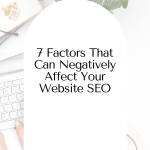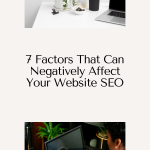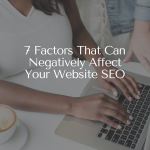
7 Factors That Can Negatively Affect Your Website SEO
Table of Contents
ToggleSharing is caring!
Reading Time: 4 minutes


What is SEO, and why is it an essential part of maintaining a successful website? In a nutshell, SEO or search engine optimization is the science of enhancing your online presence to get more exposure online.
An effective SEO strategy could boost your website's search rankings, so you'll land on the searchers’ first page. The websites on the first of the searches are perceived as trustworthy, so more people click on these websites. If you managed to top the searches with your optimized content, you would generate tidal waves of organic traffic.
But that’s easier said than done. To maintain a decent ranking, you have to use the right combination of SEO strategies. Unfortunately, some people are unknowingly making mistakes that affect their websites’ SEO. To make sure that your marketing efforts are not wasted, avoid these SEO mistakes:
Slow Loading Times
One might think that SEO is about optimizing text or image content with keywords or keyword phrases, but SEO is more than that. It’s about improving the user experience (UX) too! If your website takes forever and a day to load, your SEO ranking will take a nosedive simply because the glacial pace will put off many people, and Google is taking notice.
Yes, Google pays close attention to website speeds, specifically to the amount of time it takes for a user's browser to get the first byte of information from your website server. If your loading speed is too slow, your website will be devalued, which means you'll land at the bottom of the searches, never to be found by users again.
To avoid being sandboxed by Google, try these tips:
- Always check your website speeds.
- Compress huge image files to smaller ones but be sure that the resolution won't be affected in any way.
- Choose a reliable hosting service with robust servers.
- Host video content on your server if possible
Broken Links
When people go to your website, they expect to see the information they are looking for. But if the Infos are not there because of broken links, you are putting off many users. Worse, Google could detect if your website has lots of broken links, which will hurt your search rankings. To solve this problem, you need to:
- Conduct regular site audits to check for broken pages.
- Check internal and external links for broken links. There are lots of apps and plugins you can use to automate this task.
- Update old content instead of removing it.
- Suppose the broken content is still on your site but has been moved, just set up a 301 redirect. Avoid 404s at all costs.
Forgoing Security to Minimize Costs
Google prioritizes websites that provide a safe space for users. That's why trusted sites have higher search rankings. Switching to HTTPS helps build a trustworthy brand.
SSL certificate works to authenticate websites and servers and then encrypts user data for safety and security. Yes, switching to HTTPS will be an added expense because you have to get a dedicated IP address and buy an SSL certificate, but as far as SEO goes, this is a worthy investment.
Poorly Optimized Metadata
Optimizing your metadata with your keywords is one of the fastest yet most straightforward ways of boosting your search rankings. Make a habit out of optimizing your metadata. And don't be careless with the optimization either. You have to do this properly; otherwise, your efforts will be wasted. Avoid using generic titles for your meta info.
Avoid duplicate title meta tags because these could confuse the users while also mess with your SERPs. Inconsistencies with your meta descriptions and metatags will affect your click-through rates so avoid duplicates and discrepancies with your meta info at all cost.
Having Duplicated Content
Google and other search engines are getting better and better at detecting duplicated content. Duplicated content is very similar to your other content or content similar to competing for websites’ content. When a website is caught with copied content, Google will “devalue” the website, which means it will remain at the bottom of the search pages where users cannot see it. In the worst cases, websites with plagiarized content end up being penalized by Google.
You need original, high-quality, and valuable content to rank and attract more people. That’s why it pays to give yourself a lot of time to put together great content for your website! To keep your content unique, be creative and think of different titles for your articles or blogs. Opt for long-content instead of short content. Provide well-researched and factual information.
Poorly-Optimized Content
Keyword stuffing was frowned upon then, and it's still frowned upon now. Don't insert too many keywords because Google could flag them for suspicious activities. The number of times you’ll insert a keyword will depend on the length of the article. Ideally, you should only limit the mention of your keyword or keyword phrase to 5 for a 1000-3000 word article.
Also, use well-researched keywords, phrases that are 100% relevant to your content. Using irrelevant keywords will only hurt your SEO efforts. Google is quick to pick up keywords irrelevant to a website and penalize any site that engages in this practice.
Badly-Written Content
Badly-written content is a no-no! Even if your SEO strategies are effective, you will still lose many readers simply because NO ONE likes reading articles full of grammatical errors and typos! You don’t have to be an expert writer/editor to check your work if you’re doing all the writing. Just read the post aloud twice to see if it reads right.
You can also use various proofreading apps to detect and correct typos and grammatical errors like Grammarly or Hemingway Editor. Always proofread your work before hitting the “Publish” button.
Before diving deep into blogging, you need to know what mistakes to avoid, so you don’t have to do a do-over at all. Please don’t wait until you’re losing many viewers before solving these mistakes, no matter how simple it may be.
Most Popular Posts:
Sharing is caring!
PLEASE COMMENT BELOW